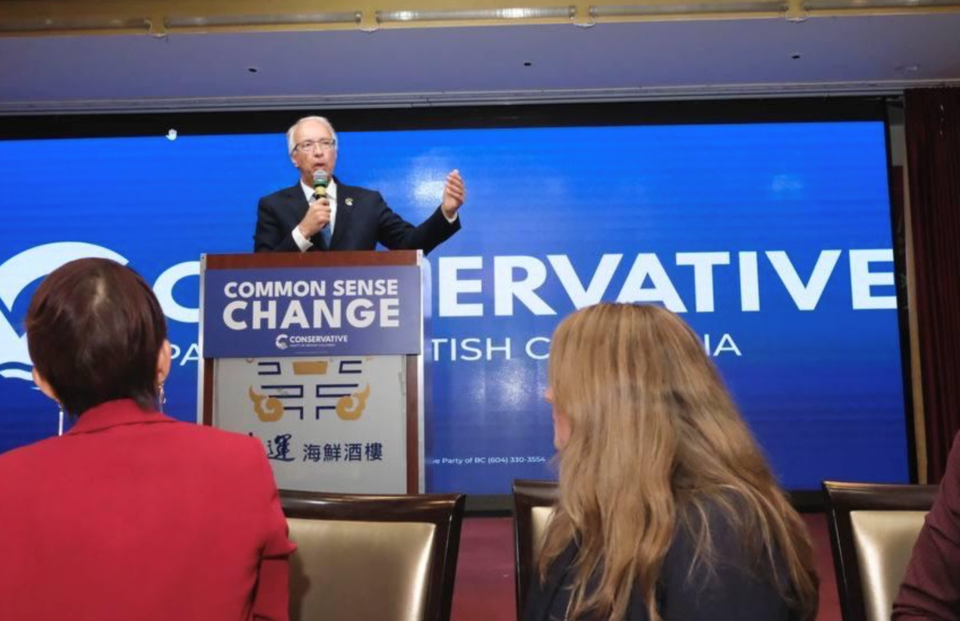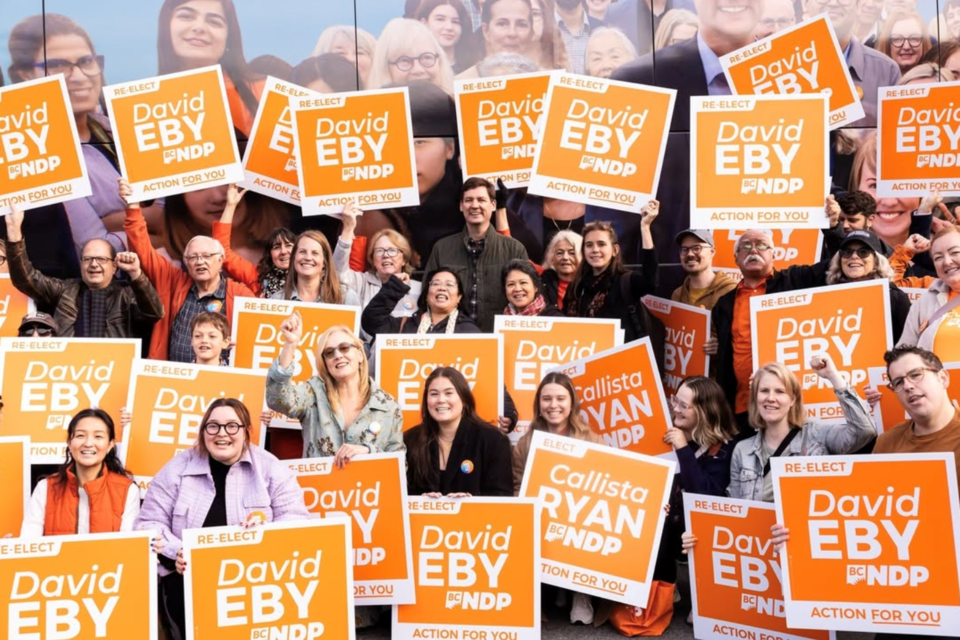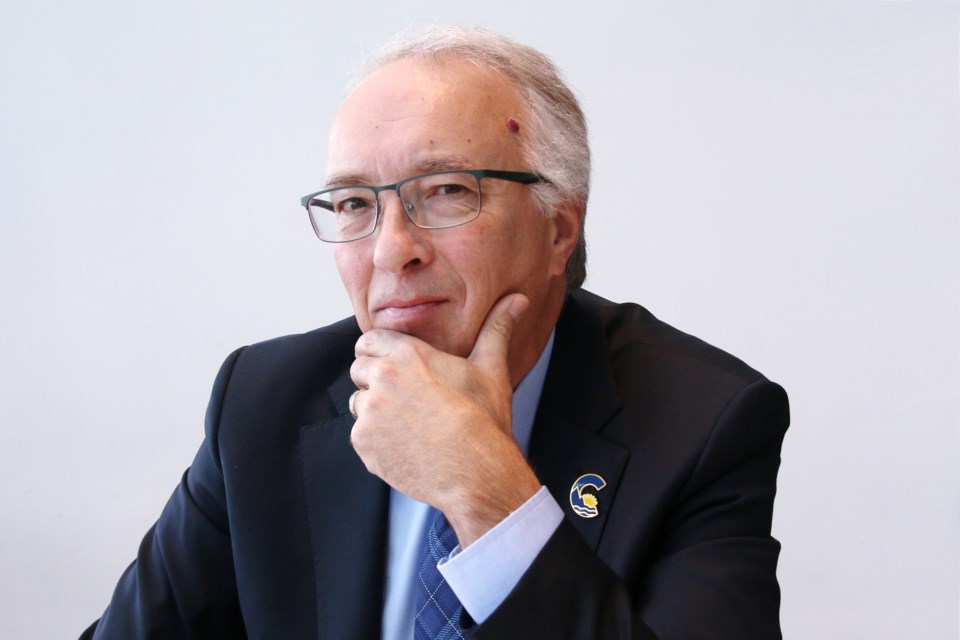John Rustad may not have won B.C.’s election on Oct. 24, but the Conservative Party of BC—a defunct party for half a century—coming within a hair’s breadth of forming government was still one of the most significant news events in British Columbia this year.
The campaign, its collateral damage, the party’s historic result and the challenging path before it in opposition are why Rustad and the BC Conservatives were selected as BIV’s newsmaker of the year.
Despite not having won a seat in the legislature since 1975, the party managed to secure 44 seats in the October election—a feat attributed to voter dissatisfaction with status quo governments across the political spectrum, the disintegration of the BC United Party and a general shift toward right-of-centre politics in Canada, the U.S. and other Western democracies.
These factors could set the stage for a BC Conservative win in the next election, which could happen sooner than expected, given the tenuous majority held by the BC NDP.
“A couple of people get sick, and the government could fall,” noted pollster Mario Canseco, president of ResearchCo. “I think there’s an opportunity now for people in the next year or two to look at the Conservatives as a government in waiting.”
The context for Rustad’s rise from political exile shares parallels with the 1970s and 1980s—a period marked by high inflation, high interest rates, recession and the election of conservative governments in Canada, the U.S. and the U.K.
Rustad benefited from the popularity of Pierre Poilievre’s federal Conservative Party, which, polls suggest, would likely form government if an election were held today.
But the MLA for Nechako Lakes also deserves credit for seizing that political opportunity, according to political pundits.
“I give them full credit,” said Bill Tieleman, a former NDP political strategist. “He was the right person at the right time, but he had to make the right decisions to get there.”
Richard Johnston, a political scientist at the Univeristy of British Columbia, said there are probably other underlying forces that worked in Rustad’s favour.
“It cannot have hurt that the conservative brand in general was enjoying a wave,” he said. “Rustad is taking advantage of trends that he didn't create but, nonetheless, he exploited them pretty well.”
Rustad comes across as a kind of accidental leader.
“It's never something I wanted to do,” he told BIV of his career as a politician.

The 61-year-old Prince George native ran a forestry consulting business before getting into politics in 2002, when he ran for a position on his local school board and was elected as a trustee.
Dissatisfaction with NDP governance under Mike Harcourt and Glen Clark prompted Rustad to consider either leaving B.C. or running for office. His wife, Kim, encouraged him to do the latter.

He was first elected as a BC Liberal MLA in 2005 and served as minister of Aboriginal Relations and Reconciliation, and later as minister of Forests, Lands and Natural Resources.
In 2022, he was kicked out of the BC Liberal caucus for not toeing the party line on certain issues, notably climate change. The last straw was when Rustad reposted a tweet by Patrick Moore, a former Greenpeace heretic with heterodox views on climate change. Moore had posted that coral growth on Australia’s Great Barrier Reef suggests that the case for carbon dioxide being “the control knob of global temperature gets weaker every day.”
When party leader Kevin Falcon kicked Rustad out of the BC Liberal caucus over the tweet, it was viewed by some as cancel culture, though Rustad himself ended up doing some cancelling of his own, rejecting a number of would-be Conservative candidates whose political and social views ranged from the bizarre to the bigoted.
Without a political home, he considered the equally defunct Social Credit Party, but settled on the BC Conservative Party, which was being rebooted by politically savvy supporters of blogger Aaron Gunn, who was kicked out of the 2021 BC Liberal leadership race. (Gunn is now running as a candidate for the federal Conservatives.)
“They decided that they would take over the Conservative Party,” said Rustad, adding that they grew the party’s membership from 500 to more than 800, and cleaned up the organization’s structure.
Rustad joined in February 2023 and was named leader in March 2023. The following month, the BC Liberals rebranded as BC United.
In September 2023, BC United Abbotsford South MLA Bruce Banman crossed the floor to join Rustad’s Conservatives, giving the newly revived party two sitting members MLAs and official party status—a significant turning point.
In the lead-up to this year’s October election, the Conservatives managed to bring their membership up to 9,000, Rustad said.
A final gust of wind in Conservative sails came at the end of August, when Falcon announced he was suspending BC United’s campaign.
One surprising trend, both in Canada and in the U.S., has been younger voters’ gravitation toward the political right.
“You’re always working … under the assumption that the young people are going to be centre-left minded,” said Canseco, in reference to the recent U.S. presidential election. “I thought that was interesting to watch—the fact that you have a sense of dismay from the 18-to-34-year-old crowd really going for the Republicans.”
“We saw it in spades,” Rustad said of Millennial and Gen-Z support for the BC Conservatives. “We were very strong with the younger votes.”
Rustad said voters aged 18-35 were his largest support base, and that he believes their alternative media diet may have had something to do with it. Younger voters tend not to get their news and political views from legacy and mainstream media, but from sources such as Tik Tok, Youtube, social media and podcasts.
“The group that we struggled the most with is a group that also uses the non-traditional media—the social media—the least,” Rustad said. “They got most of their information from traditional media, and that's where we failed to be able to connect with people.”
While it’s long been the case that younger people tend to skew left, especially on social issues, it’s also true that they can be more malleable politically.
“It is generally the case that, if a force runs through the electorate, even a short-term one like economic discontent, it will actually be more strongly reflected in younger voters than in older ones,” Johnston said.
Incumbent and liberal-leaning governments too focused on issues like social justice and climate change have at times been inattentive to basic bread-and-butter concerns in the daily lives of voters: Crime and homelessness, overcrowded hospital emergency rooms and unaffordable housing.
“I think a lot of air went out of the room with discussions on issues that really aren’t top of mind for voters, such as plastic straws or bathrooms,” Canseco said.
Rustad’s campaign pledges included scrapping the carbon tax, reversing drug decriminalization, eliminating sexual orientation and gender identity curricula from public schools, getting tough on crime, and supporting resource development—issues that resonated with many voters, especially those outside of urban centres.
The post-election map shows a clear rural-urban divide in B.C., with BC Conservatives elected to most of the province’s rural blue-collar ridings, which fall in regions hit with sawmill and pulp mill closures in recent years.
Tieleman notes that Poilievre’s Conservatives and Donald Trump have also been courting union support and attracting more blue-collar voters.
“I would suggest that, basically, social democratic parties—parties of the centre-left—have gotten too consumed with identity politics, at the expense of working class or class politics,” he said.
Climate change—the topic that got Rustad kicked out of the BC United caucus, and was a top concern for many in previous elections—barely came up during the recent campaign, said the BC Conservative leader.
“I don't think it's so much a trend towards a particular political perspective, but it's a trend of change,” Rustad said. “There's a tremendous growing amount of distrust in government and government institutions, and so people are looking for change.”
Canseco agrees: “I think it’s more related to a dissatisfaction with the status quo. We’ve seen it in places where the shift is not necessarily ideological.”
Rustad’s rise was assisted by Falcon’s fall. One of the leader’s challenges going forward will be maintaining party discipline among a fractious group of maverick MLAs.
Dissent among the ranks of the official Opposition have already bubbled up.
Thirteen of 44 BC Conservative MLAs wrote a letter to Rustad—leaked to CKNW radio host and former BC Liberal MLA Jas Johal—that called on Rustad to oblige one of his party’s higher profile ex-Liberal MLAs, Elenore Sturko, to apologize to a former Vancouver Police Board member, who was fired from the board for social media posts expressing Christian-conservative views on culture and gender shared by the signatories.
Comfort Sakoma-Fadugb had made posts on issues such as gender transitioning among children, and the replacement of traditional Canadian-Christian values with the values of other cultures.
After she was fired from the police board, Sturko, a former RCMP officer, publicly supported her removal.
Sturko has refused to apologize to Sakoma-Fadugb, but Rustad has. He addressed the controversy on X, where he said he and Sakoma-Fadugb talked about “shared values of family, faith and community and what it means to be proudly Christian and proudly conservative.”
“I don’t believe she should have been asked to quit the VPD police board,” Rustad wrote. “However, I also understand the critical importance of freedom of speech, particularly for MLAs.”
He added that he believes Sturko should meet with Sakoma-Fadugb.





